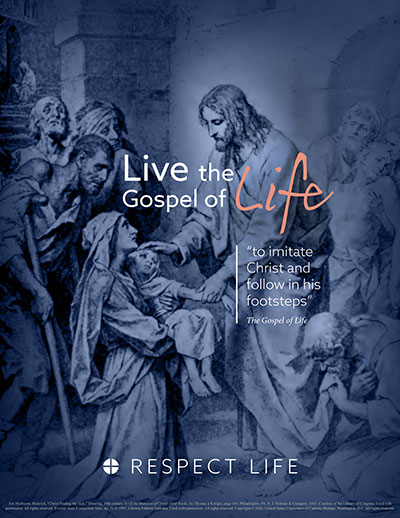 This year the Church celebrates the 25th anniversary of the landmark pro-life encyclical “Evangelium vitae” (“The Gospel of Life”). Written by St. John Paul II, this prophetic document passionately reaffirmed the Church’s constant teaching on the value and sacredness of every human life.
This year the Church celebrates the 25th anniversary of the landmark pro-life encyclical “Evangelium vitae” (“The Gospel of Life”). Written by St. John Paul II, this prophetic document passionately reaffirmed the Church’s constant teaching on the value and sacredness of every human life.
St. John Paul II wrote that the Gospel of life is at the heart of Jesus’ saving message to the world (“Evangelium vitae,” 1). In taking on human flesh, dwelling among us, and sacrificing His very life for our redemption, Christ reveals the profound dignity of every human person.
This God-given dignity does not change with our stage of life, abilities, level of independence, or any other varying circumstance.
Rather, it is rooted in the permanent fact that each of us is made in the image and likeness of God, created to share in the very life of God Himself. The human person is a “manifestation of God in the world, a sign of His presence, a trace of His glory” (“Evangelium vitae,” 34).
We must reflect this truth in how we act and how we treat one another.
The truth of the Gospel of life is at the foundation of who we are as followers of Christ. In His earthly life, Jesus provided the perfect model for how we are to love our neighbor and live out the Gospel call: “Truly, I say to you, as you did it to one of the least of these my brethren, you did it to me” (Mt 25:40).
Jesus calls each of us to “care for the other as a person for whom God has made us responsible” (“Evangelium vitae,” 87). The Gospel of life is intrinsic to the whole Christian life and foundational to the decisions we make on a daily basis. For, “the Gospel of God’s love for man, the Gospel of the dignity of the person and the Gospel of life are a single and indivisible Gospel” (“Evangelium vitae,” 2).
In his encyclical on the Gospel of life, St. John Paul II recognizes the full range of threats against human life, from poverty and malnutrition to murder and war. He places particular emphasis, however, on threats to life at its beginning and end – precisely when it is most in need of protection. In modern times, children in their mothers’ wombs and those approaching the end of their lives are certainly among the “least of these” in our world’s estimation. Practices such as abortion and assisted suicide tragically reject the truth that human life is always to be cherished and defended with loving concern.
As the Church celebrates the 25th anniversary of St. John Paul II’s prophetic encyclical, let us reflect on how we personally live out the Gospel: Do I talk about and act towards others as I would talk about and treat Jesus Himself? Do I inform myself of the Church’s teachings and engage in the civic arena as first a follower of Christ? Do I support and advocate for laws and policies that protect and defend human life? Do I help pregnant and parenting mothers in need? Am I ready to support a loved one nearing death?
Through the intercession of Our Lady of Guadalupe, may Our Lord grant us the grace to truly and courageously live His Gospel of life.
— U.S. Conference of Catholic Bishops
What we believe: Excerpts from the Catechism
As Catholics, we know that God alone is the Creator and Lord of life. “Every human life, from the moment of conception until death, is sacred because the human person has been willed for its own sake in the image and likeness of the living and holy God” (Catechism of the Catholic Church, 2319). Our respect for all human life must be absolute – despite what today’s society may say on such issues as abortion or euthanasia:
Abortion
From its conception, the child has the right to life. (CCC 2322)
Euthanasia
Intentional euthanasia, whatever its forms or motives, is murder. (CCC 2324)
Suicide
Suicide is seriously contrary to justice, hope and charity. (CCC 2325)
More online
At www.respectlife.org: Explore educational and prayer resources, learn more about Church teaching on life issues, download the “Gospel of Life” study guide, and check out simple steps for celebrating at home or at your parish.


